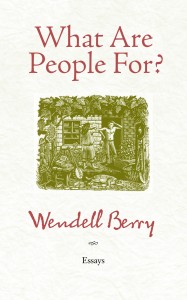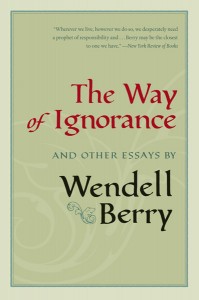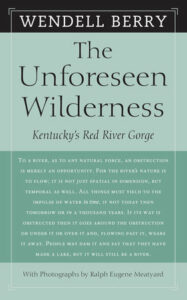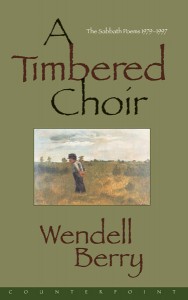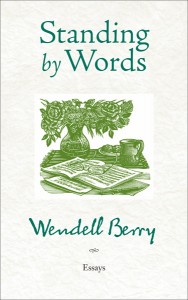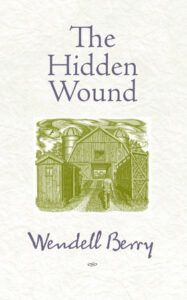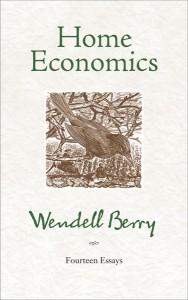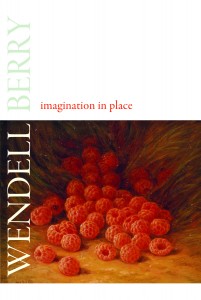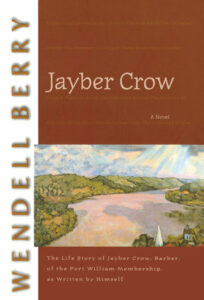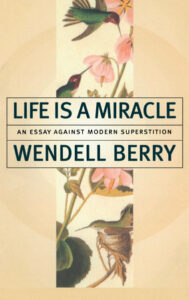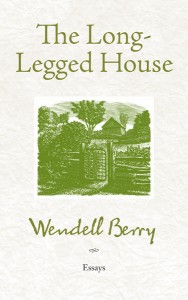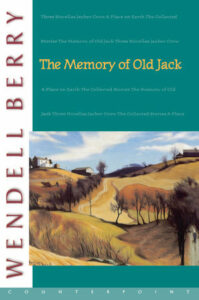Wendell Berry
Wendell Berry is the author of fifty books of poetry, fiction, and essays. He was recently awarded the Cleanth Brooks Medal for Lifetime Achievement by the Fellowship of Southern Writers and the Louis Bromfield Society Award. For over forty years he has lived and farmed with his wife, Tanya, in Kentucky.
Subscribe to our newsletter for news & events from Counterpoint Press.
Books
What Are People For?
Essays
Ranging from America’s insatiable consumerism and household economies to literary subjects and America’s attitude toward waste, here Berry gracefully navigates from one topic to the next. He speaks candidly about the ills plaguing America and the growing gap between people and the land. Despite the somber nature of these essays, Berry’s voice and prose provide an underlying sense of faith and hope. He frames his reflections with poetic responsibility, standing up as a firm believer in the power of the human race not only to fix its past mistakes but to build a future that will provide a better life for all.The Way of Ignorance
And Other Essays
A soulful, searching collection of essays that tackle the complexities of contemporary America from “the prophet of rural America” (New York Times).From the war in Iraq to Hurricane Katrina to the political sniping engendered by Supreme Court nominations—contemporary American society is characterized by divisive anger, profound loss, and danger. Wendell Berry, “the prophet of rural America” (New York Times) and one of the country’s foremost cultural critics, responds with hope and intelligence in a series of essays that tackle the major questions of the day. Whose freedom are we considering when we speak of the free market or free enterprise? What is really involved in our national security? What is the price of ownership without affection? Berry answers in prose that shuns abstraction for clarity, coherence, and passion, giving us essays that may be the finest of his long career. “Everything in the book illumines.” —Booklist
“[Berry’s] poems, novels and essays . . . are probably the most sustained contemporary articulation of America’s agrarian, Jeffersonian ideal.” —Publishers Weekly
“Wendell Berry is one of those rare individuals who speaks to us always of responsibility, of the individual cultivation of an active and aware participation in the arts of life.” —The Bloomsbury Review
The Unforeseen Wilderness
Kentucky's Red River Gorge
Only someone who values land enough to farm a hillside for more than thirty years could write about a wild place so lovingly. Wendell Berry just as easily steps into Kentucky's Red River Gorge and makes the observations of a poet as he does step away to view his subject with the keen, unflinching eye of an essayist. The inimitable voice of Wendell Berry—at once frank and lovely—is our guide as we explore this unique wilderness.Located in eastern Kentucky and home to 26,000 acres of untamed river, rock formations, historical sites, unusual vegetation and wildlife, the Gorge very nearly fell victim to a man–made lake thirty years ago. "No place is to be learned like a textbook," Berry tells us, and so through revealing the Gorge's corners and crevices, its ridges and rapids, his words not only implore us to know more but to venture there ourselves. Infused with his very personal perspective and enhanced by the startling photographs of Ralph Eugene Meatyard, The Unforeseen Wilderness draws the reader in to celebrate an extraordinary natural beauty and to better understand what threatens it.
A Timbered Choir
The Sabbath Poems 1979-1997
Berry’s Sabbath Poems embrace much that is elemental to human life—beauty, death, peace, and hope. In his preface, Berry writes about the growing audience for public poetry readings. While he sees poetry in the public eye as a good thing, Berry asks us to recognize the private life of the poem. These Sabbath Poems were written ""in silence, in solitude, and mainly out of doors,"" and tell us about ""moments when heart and mind are open and aware."Wendell Berry is beloved for his quiet, steady explorations of nature, his emphasis on finding good work to do in the world, and his faith in the solace of family, memory, and community. His poetry is assured and unceasingly spiritual; its power lies in the strength of the truths revealed.
Standing by Words
Essays
An urgent, visionary, and heartfelt collection of essays focused on recovering deeper, time–honored values against the ravages of modern society.In six elegant, linked literary essays, Berry considers the degeneration of language that is manifest throughout our culture, from poetry to politics, from conversation to advertising, and he shows how the ever–widening cleft between the words and their referents mirrors the increasing isolation of individuals and their communities from the land.
“This skillfully conceived book is one of the strongest contemporary arguments for literary tradition: a challenging credo, un–glib, calmly assured, clearly illuminating—and required reading for those seriously interested in the interplay between literature, ethics, and morality.” —Kirkus Reviews
“[Berry’s] poems, novels and essays . . . are probably the most sustained contemporary articulation of America’s agrarian, Jeffersonian ideal.” —Publishers Weekly
The Hidden Wound
An impassioned, thoughtful, and fearless essay on the effects of racism on the American identity by one of our country’s most humane literary voices.Acclaimed as “one of the most humane, honest, liberating works of our time” (The Village Voice), The Hidden Wound is a book-length essay about racism and the damage it has done to the identity of our country. Through Berry’s personal experience, he explains how remaining passive in the face of the struggle of racism further corrodes America’s great potential. In a quiet and observant manner, Berry opens up about how his attempt to discuss racism is rooted in the hope that someday the historical wound will begin to heal. Pulitzer prize-winning author Larry McMurtry calls this “a profound, passionate, crucial piece of writing . . . Few readers, and I think, no writers will be able to read it without a small pulse of triumph at the temples: the strange, almost communal sense of triumph one feels when someone has written truly well . . . The statement it makes is intricate and beautiful, sad but strong.”
“Mr. Berry is a sophisticated, philosophical poet in the line descending from Emerson and Thoreau." ―The Baltimore Sun
"[Berry’s poems] shine with the gentle wisdom of a craftsman who has thought deeply about the paradoxical strangeness and wonder of life." ―The Christian Science Monitor
"Wendell Berry is one of those rare individuals who speaks to us always of responsibility, of the individual cultivation of an active and aware participation in the arts of life." ―The Bloomsbury Review
“[Berry’s] poems, novels and essays . . . are probably the most sustained contemporary articulation of America’s agrarian, Jeffersonian ideal.” ―Publishers Weekly
Home Economics
Fourteen Essays
In Home Economics, Berry explores what it means to make oneself “responsibly at home.” As he argues, a measure of the health of the planet is economics—the health of its households."Wherever we live, however we do so, we desperately need a prophet of responsibility; and although the days of the prophets seem past to many of us, Berry may be the closest to one we have. But, fortunately, he is also a poet of responsibility. He makes one believe that the good life may not only be harder than what we're used to but sweeter as well." —The New York Review of Books
Imagination in Place
“Berry's latest collection of essays is the reminiscence of a literary life. It is a book that acknowledges a lifetime of intellectual influences, and in doing so, positions Berry more squarely as a cornerstone of American literature . . . A necessary book. Here, Berry's place as the 'grandfather of slow food' or the 'prophet of rural living' is not questioned. This book ensures we understand the depth and breadth of Berry's art.” —San Francisco Chronicle“[A] stellar collection . . . Foodies, architects, transportation engineers, and other writers are adopting and adapting [Berry’s] concepts, perhaps leading to what he envisions will one day be 'an authentic settlement of our country.'“ —The Oregonian
A writer who can imagine the “community belonging to its place” is one who has applied his knowledge and citizenship to achieve the goal to which Wendell Berry has always aspired—to be a native to his own local culture. And for Berry, what is “local, fully imagined, becomes universal,” and the “local” is to know one's place and allow the imagination to inspire and instill “a practical respect for what is there besides ourselves."
In Imagination in Place, we travel to the local cultures of several writers important to Berry's life and work, from Wallace Stegner's great West and Ernest Gaines' Louisiana plantation life to Donald Hall's New England, and on to the Western frontier as seen through the Far East lens of Gary Snyder. Berry laments today's dispossessed and displaced, those writers and people with no home and no citizenship, but he argues that there is hope for the establishment of new local cultures in both the practical and literary sense.
Rich with Berry's personal experience of life as a Kentucky agrarian, the collection includes portraits of a few of America's most imaginative writers, including James Still, Hayden Carruth, Jane Kenyon, John Haines, and several others.
Jayber Crow
A Novel
“This is a book about Heaven,” says Jayber Crow, “but I must say too that . . . I have wondered sometimes if it would not finally turn out to be a book about Hell.” It is 1932 and he has returned to his native Port William to become the town's barber.Orphaned at age ten, Jayber Crow’s acquaintance with loneliness and want have made him a patient observer of the human animal, in both its goodness and frailty.
He began his search as a “pre–ministerial student” at Pigeonville College. There, freedom met with new burdens and a young man needed more than a mirror to find himself. But the beginning of that finding was a short conversation with “Old Grit,” his profound professor of New Testament Greek.
“You have been given questions to which you cannot be given answers. You will have to live them out—perhaps a little at a time.”
“And how long is that going to take?”
“I don't know. As long as you live, perhaps.”
“That could be a long time.”
“I will tell you a further mystery,” he said. “It may take longer.”
Wendell Berry’s clear–sighted depiction of humanity’s gifts—love and loss, joy and despair—is seen though his intimate knowledge of the Port William Membership.
Life Is a Miracle
An Essay Against Modern Superstition
“[A] scathing assessment . . . Berry shows that Wilson's much–celebrated, controversial pleas in Consilience to unify all branches of knowledge is nothing more than a fatuous subordination of religion, art, and everything else that is good to science . . . Berry is one of the most perceptive critics of American society writing today.” —The Washington Post“I am tempted to say he understands [Consilience] better than Wilson himself . . . A new emancipation proclamation in which he speaks again and again about how to defy the tyranny of scientific materialism.”—The Christian Science Monitor
In Life Is a Miracle, the devotion of science to the quantitative and reductionist world is measured against the mysterious, qualitative suggestions of religion and art. Berry sees life as the collision of these separate forces, but without all three in the mix we are left at sea in the world.
The Long-Legged House
First published in 1969 and out of print for more than twenty–five years, The Long–Legged House was Wendell Berry's first collection of essays, the inaugural work introducing many of the central issues that have occupied him over the course of his career. Three essays at the heart of this volume―“The Rise,” “The Long–Legged House,” and “A Native Hill”―are essays of homecoming and memoir, as the writer finds his home place, his native ground, his place on earth. As he later wrote, “What I stand for is what I stand on,” and here we see him beginning the acts of rediscovery and resettling.The Memory of Old Jack
Old Jack, born just after the American Civil War and dying in contemporary times, spends one beautiful September day in Port William, his home since birth, remembering.The story tells of the most searing moments of Old Jack’s life, particularly his debt to his sister Nancy and her husband Ben Feltner, Old Jack’s model of what an honorable manhood and strength might be.
"Few novelists treat both their characters and their readers with the kind of respect that Wendell Berry displays in this deeply moving account . . . The Memory of Old Jack is a slab of rich Americana."—The New York Times Book Review

Catapult | Counterpoint | Soft Skull
20 Jay Street #704
Brooklyn, NY 11201
646.926.0805 | contact@catapult.co





